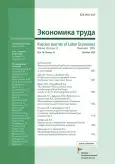Accounting methodological features in conditions of uncertainty of the influence of psychosocial risk factors on the decline in agricultural labor productivity
- Authors: Shirokov Y.A.1, Borulko V.G.1, Mochunova N.A.1, Filippov S.A.1
-
Affiliations:
- Russian State Agrarian University - Moscow Timiryazev Agricultural Academy
- Issue: Vol 10, No 11 (2023)
- Pages: 1781-1793
- Section: Articles
- URL: https://journals.eco-vector.com/2410-1613/article/view/625126
- DOI: https://doi.org/10.18334/et.10.11.119795
- ID: 625126
Cite item
Abstract
The article is devoted to the definition of a possible methodological approach to assessing the impact of psychosocial risk factors on the decline in labor productivity under conditions of uncertainty (unlikely scenarios). It is shown that there is a need to introduce mechanisms for analyzing the economic consequences of the implementation of occupational risk, which allow to solve the problem of unlikely scenarios, primarily related to the human factor and not intentional errors due to overwork or age-related changes in the cognitive abilities of the employee, such as attention, memory, and reaction speed, and simulate the associated uncertainty in assessing the prospects for economic losses. In the case of assessing the economic consequences of the implementation of occupational risk, the methodology of the Grey System Theory and the theory of the Black Swan Theory can be applied. For research purposes to assess economic losses from unfavorable working conditions and to analyze the socio-economic consequences of labor inefficiency under conditions of uncertainty, regression equations are proposed. Using this approach to the economic assessment of potential damage and the economic effectiveness of the proposed measures for labor protection and safety, it is possible to convincingly justify the expediency of spending on improving working conditions and increasing its productivity, as well as to protect the quality of occupational safety to the company owners.
About the authors
Yuriy Aleksandrovich Shirokov
Russian State Agrarian University - Moscow Timiryazev Agricultural Academy
Email: Shirokov001@mail.ru
Vyacheslav Grigoryevich Borulko
Russian State Agrarian University - Moscow Timiryazev Agricultural Academy
Email: borulko@rgau-msha.ru
Natalya Aleksandrovna Mochunova
Russian State Agrarian University - Moscow Timiryazev Agricultural Academy
Email: n.mochunova@ rgau-msha.ru
Sergey Alekseevich Filippov
Russian State Agrarian University - Moscow Timiryazev Agricultural Academy
Email: filippov@ rgau-msha.ru
References
- Широков Ю. А., Ивакина Е.Г. Производительность и условия труда: связь и перспективы улучшения // Экономика труда. – 2021. – № 3. – c. 251-260. – doi: 10.18334/et.8.3.111812.
- Широков Ю.А., Тихненко В.Г., Ивакина Е.Г., Имамзаде А.И. Методические особенности анализа влияния условий труда на себестоимость продукции // Экономика труда. – 2022. – № 2. – c. 419-434. – doi: 10.18334/et.9.2.114169.
- Васильева Л.А., Тараканов Д.А. Корреляционный анализ травматизма и расходов на охрану труда // Карельский научный журнал. – 2015. – № 2(11). – c. 101-103.
- Shirokov Y., Kovrigo O., Ryabchikova V. Influence of working conditions in agricultural enterprises on fatigue and labor productivity // 14th international scientific and practical conference on state and prospects for the development of agribusiness, interagromash 2021: E3S Web of Conferences. Том 273. Rostov-on-Don, 2021.– doi: 10.1051/e3sconf/202127312024.
- Rezagholi M. Differential Socio-Economic Effects of Work Environmental Risk Factors // Journal of Health and Medical Economics. – 2016. – p. 1-8.
- Mele C.,Pels J., Polese F. A Brief Review of Systems Theories and Their Managerial Applications // Service Science. – 2010. – № 2(1-2). – p. 126-135. – doi: 10.1287/serv.2.1_2.126.
- Aven T. On the meaning of the special-cause variation concept used in the quality discourse-and its link to unforeseen and surprising events in risk management // Reliability Engineering and System Safety. – 2014. – p. 81-86.
- Mahmoud Rezagholi Economic Decisions on Proposed Work Environmental Studies – a Theory for Cost and Value of Information // Science Journal of Public Health. – 2016. – № 1. – p. 11-19. – doi: 10.11648/j.sjph.20160401.12.
- Rezagoli M., Bantekas A. Optimization of the share of expensive direct measurements in the impact assessment study // International Journal of Medical Research Statistics. – 2014. – № 3. – p. 44-45.
- Amoah Acquaah F.A., Sarfo J.O. Psychosocial work environment and sickness absence: the role of gender // European Scientific Journal. – 2014. – № 20. – p. 52-58.
- Brunner B., Igic I., Keller A.C., Wieser S. Who gains the most from improving working conditions? Health-related absenteeism and presenteeism due to stress at work // The European Journal of Health Economics. – 2019. – p. 1165-1180. – doi: 10.1007/s10198-019-01084-9.
- Широков Ю.А. Оценка рисков в сфере безопасности труда в связи с повышением пенсионного возраста // Безопасность труда в промышленности. – 2020. – № 6. – c. 29-34. – doi: 10.24000/0409-2961-2020-6-29-34.
- Terje Aven Implications of black swans to the foundations and practice of risk assessment and management // Reliability Engineering and System Safety. – 2015. – p. 83-91.
- Ehsan Javanmardi, Sifeng Liu Exploring Grey Systems Theory-Based Methods and Applications in Analyzing Socio-Economic Systems Institute for Grey Systems Studies // Sustainability. – 2019. – № 15. – p. 4192. – doi: 10.3390/su11154192.
- Okman J.S., Neupane, S.I.K., Relative N., Class-Hakan N. Workplace health improvement activities: a systematic review and meta-analysis of their effectiveness // Scandalous Work Surrounds Health. – 2018. – № 2. – p. 134-146. – doi: 10.5271/sweeh.3683.
Supplementary files











